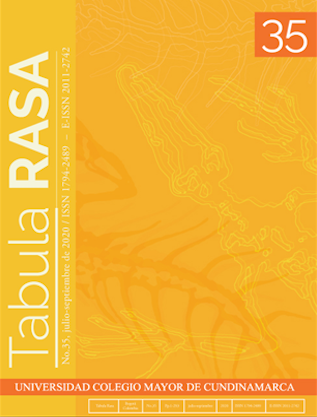Theorizing a philosophy of marronage.
Teorizando una filosofía del cimarronaje.
Show authors biography
This article consists of an elaboration of a philosophical conception of marronage to put it in conversation with decolonial thought, in broad terms. This consists of a discussion of the concept sociogenic marronage, which is defined as flight from the oppressive forces of European modernity through decolonial political praxis, and analectical marronage, which I define as flight from European modernity itself. I argue that the relationship between these two phenomena constitutes what I have called the double maroon critique
and that its concrete manifestation, in different configurations, constitutes what I have called maroon logics. I argue that analectical marronage has a pedagogical element which has the potential to initiate a decolonial turn. Finally, I briefly look at the events from what has been called the “Puerto Rican Summer of 2019” through this conceptual framework, which I have denoted philosophy of marronage, to identify characteristics of marronage, in the ontological sense I elaborate, in contemporary Puerto Rican society
along with some parallels with the Haitian Revolution.
Article visits 212 | PDF visits 129
Downloads
- Bledsoe, A. (2017). Marronage as Past and Present Geography in the Americas. Southeastern Geographer, 57(1), 30-50.
- Carrera Damas, G. (2006). Huida y enfrentamiento. En M. M. Fraginals (Ed.), África en América Latina (pp. 34-52). México: Siglo XXI.
- Chamoiseau, P. (2018). Slave Old Man. Nueva York: The New Press.
- Colectiva Feminista en Construcción. (2017). La Manifiesta. www.facebook.com/Colectiva.Feminista.PR
- Du Bois, W. E. B. (2017). The Souls of Black Folk. Brooklyn: Restless Books.
- Durán De Seade, E. (1979). State and History in Hegel’s Concept of People. Journal of the History of Ideas, 40(3), 369-84.
- Dussel, E. (2016). 14 tesis de ética: hacia la esencia del pensamiento crítico. Madrid: Trotta.
- Dussel, E. (2011). Filosofía de la liberación. México: Fondo de Cultura Económica.
- Dussel, E. (2010). 20 tesis de política. México: Siglo XXI.
- Espinosa Miñoso, Y. & Rodríguez Moreno, C. (2020, 13 de marzo). Hacia la recuperación de una memoria de resistencia afrocaribeña en República Dominicana. Clacso. https://www.clacso.org/hacia-la-recuperacion-de-una-memoria-de-resistencia-afrocaribena-enrepublica-dominicana/
- Fanon, F. (2008). Black Skin, White Masks. New York: Grove Press.
- Figueroa Cancel, A. (2018, 28 de abril). Una comunidad en Lares encuentra esperanza en escuela abandonada. El Nuevo Dia. https://www.elnuevodia.com/noticias/locales/nota/unacomunidadenlaresencuentraesperanzaenescuelaabandonada-2418346/
- Garriga-López, A. (2019). Puerto Rico: The Future in Question. Shima: The International Journal of Research into Island Cultures, 13(2), 174-192.
- Glissant, É. (2010). Poetics of Relation. Ann Arbor: The University of Michigan Press.
- Gordon, L. R. (2013). Thoughts on Dussel’s ‘Anti-Cartesian Meditations.’ Human Architecture: Journal of the Sociology of Self-Knowledge, 11(1),67-72.
- Grosfoguel, R. (2013). The Structure of Knowledge in Westernized Universities: Epistemic Racism/Sexism and the Four Genocides/Epistemicides of the Long 16th Century. Human Architecture: Journal of the Sociology of Self-Knowledge, 1(1), 73-90.
- Harney, S. & Moten, F. (2019). Los abajocomunes: planear fugitivo y estudio negro. México: La Campechana Mental Rancho Electrónico. http://www.craterinvertido.org/archivos/abajocomunes/abajocomunes.pdf
- Henry, P. (2000). Caliban’s Reason: Introducing Afro-Caribbean Philosophy. New York: Routledge.
- Herrera, I. (2019, July 25). For This Feminist Collective in Puerto Rico, the Mass Protests Were a Long Time Coming. The New York Times. https://www.nytimes.com/2019/07/25/style/feminist-collective-puerto-rico-protests.html
- Hooks, B. (1989). Choosing the Margins as a Space of Radical Openness. Framework: The Journal of Cinema and Media, 36, 15-23.
- Jiménez, L. (2019, 21 de marzo). Toman el control de sus comunidades.Primera Hora. https://www.primerahora.com/suroeste/noticias/puerto-rico/nota/tomanelcontroldesuscomunidades-1333091/
- Lambert, L. (2014, December 30). Abysmal Atlantic: The Slave Ships’ Genocide. TheFunambulist. https://thefunambulist.net/architectural-projects/history-abysmal-atlanticthe-slave-ships-genocide
- Lorde, A. (2012, August 12). Learning from the 60s. BlackPast. https://www.blackpast.org/african-american-history/1982-audre-lorde-learning-60s/
- Santory Jorge, A. & Quintero Rivera, M. (Comps.) (2018). Antología del pensamientocrítico puertorriqueño contemporáneo. Buenos Aires: Clacso.
- Lao-Montes, A. (2017). La filosofía de la liberación y sus avatares descoloniales en clave de africanía. Analysis, 20, (5), 1-37.
- León Castro, E. (2015). Acercamiento crítico al cimarronaje a partir de la teoría política, los estudios culturales, y la filosofía de la existencia. (Tesis de doctorado). Universidad Andina Simón Bolívar, Quito, Ecuador. http://repositorio.uasb.edu.ec/handle/10644/4679
- Maldonado-Torres, N. (2016, October 23). Outline of Ten Theses on Coloniality and Decoloniality. Caribbean Studies Association. http://caribbeanstudiesassociation.org/docs/Maldonado-Torres_Outline_Ten_Theses-10.23.16.pdf
- Maldonado-Torres, N. (2008). Against War: Views from the Underside of Modernity. Durham: Duke University Press.
- Maldonado-Torres, N. (2007). Sobre la colonialidad del ser: contribuciones al desarrollo de un concepto. En S. Castro-Gómez & R. Grosfoguel (Eds.). El giro decolonial. Reflexiones para una diversidad epistémica más allá del capitalismo global (pp. 127-167). Bogotá: Siglo del Hombre Editores / Iesco-UC / Pontificia Universidad Javeriana.
- Manigat, L. F. (1977). The Relationship Between Marronage and Slave Revolts and Revolution in St. Domingue-Haiti. Annals of the New York Academy of Sciences, 292, 420-438.
- Marshall, E. Z. (2012). Anansi’s Journey: A Story of Jamaican Cultural Resistance. Kingston: University of the West Indies Press.
- Ortiz Santiago, A. (2019, July 22). How Misogyny and #TelegramGate Led to the Protests in Puerto Rico. Zora. Medium. https://zora.medium.com/how-misogyny-andtelegramgate-led-to-the-protests-in-puerto-rico-72ec58ebf557
- Price, R. (Ed.). (1996). Maroon Societies: Rebel Slave Communities in the Americas. Baltimore: The John Hopkins University Press.
- Quintero Rivera, Á. (1985). La cimarronería como herencia y utopía. David y Goliath, XV(48), 37-51.
- Roberts, N. (2015). Freedom as Marronage. Chicago: The University of Chicago Press.
- Rosario, F. (2019, 22 de agosto). Mujeres se reúnen con la gobernadora para discutir problemas de violencia. Primera Hora. https://www.primerahora.com/noticias/gobierno-politica/nota/mujeressereunenconlagobernadoraparadiscutirproblemasdeviolencia-1359769/
- San Miguel, P. L. (2004). Los desvaríos de Ti Noel: ensayos sobre la producción del saber en el Caribe. San Juan: Ediciones Vértigo.
- Zambrana, R. (2020, February). Black Feminist Tactics: On La Colectiva Feminista En Construcción’s Politics without Guarantees. Society & Space. https://www.societyandspace.org/articles/black-feminist-tactics-on-la-colectiva-feminista-en-construccions-politicswithout-guarantees








